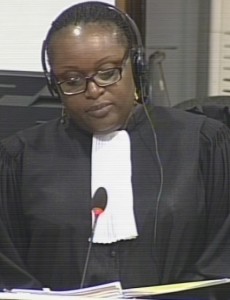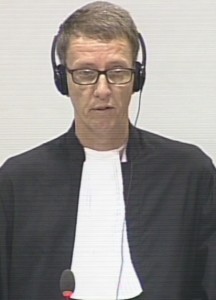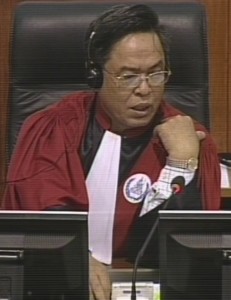Discussion about Delay of Trial Chamber Proceedings
Today’s hearing before the ECCC was a brief session that consisted of the announcement that neither 2-TCW-904, nor 2-TCW-996 could be heard today or tomorrow and a discussion about a possible halt of the proceedings to prepare for the Supreme Court hearings in November.

International Khieu Samphan Defense Counsel Anta Guissé
With a delay of 20 minutes, the proceedings started. The President announced that today’s witness Suf Romly (2-TCW-904) and tomorrow’s witness 2-TCW-996 (in relation to Trapeang Thma Dam worksite) could not be heard. He explained that Nuon Chea Defense Counsel Victor Koppe had made an observation yesterday in relation to a conflict of interest of the duty counsel and witness. The President announced that no ruling had been made yet regarding the conflict of interest. Further, no other counsel was available of the three duty counsels. The President then referred to disclosures of cases 003 and 004 that raised procedural matters that had been raised by the defense teams. For this reason, the chamber could neither hear the testimony of the current witness, Suf Romly today, nor hear witness 2-TCW-996 tomorrow.
However, he gave the floor to the defense counsel to make comments in relation to issues that had been raised during the past few days.
International Khieu Samphan Defense Counsel Anta Guissé first reacted to the observations made with regards to the preparation time needed for the Supreme Court Hearings. She stated that new details had been given from the Supreme Court: the final submissions are scheduled for the 16th to 18th November. However, there would be a possibility that witnesses would be heard before that date. She reiterated the position that no hearings of the Trial Chamber should be heard during the preparation time. This would amount to a time of ideally five weeks to account for the unknown factor of the possibility of hearing witnesses in front of the Supreme Court Chamber. She therefore requested the Trial Chamber to not schedule any new witnesses after the Pchum Ben holidays and before November 18th.
International Nuon Chea Defense Counsel Victor Koppe stated that he conquered with the request of the Khieu Samphan Defense Team, with one exception. He requested witness 2-TCW-996 to be heard before the Supreme Court hearings, since this witness might be relevant for the appeal.
The International Co-Prosecutor Nicholas Koumjian was generally not against a break of trial chamber hearings. However, he stated that five weeks would be excessive. He explained that the Co-Prosecution’s appeal brief had been filed in March or April this year and was therefore known to the defense teams. He requested a break of one week. Looking at his schedule, he stated that the best option in his mind would be to stop the hearings from November 5th onwards. This would give all teams an additional ten days to prepare. Moreover, not all appeal grounds were relevant for both defense teams, while the Prosecution had to prepare for all of them. Nevertheless, he considered ten days sufficient time to prepare. The National Deputy Co-Prosecutor Song Chorvoin conquered with this position.

International Nuon Chea Defense Counsel Victor Koppe
Civil Party Lead Co-Lawyer Marie Guiraud reminded the chamber of Rule 109, in which it is stated that during Supreme Court hearings, the Defense Team would have to present briefly the appeal grounds in. “The point is not to find new grounds” and to develop new strategies, but to find those points that could be explored in the Appeal Hearing. She stressed that the article set out that this had to be brief. Thus, the defense teams would not have to find new grounds, new strategies or new arguments, but point out the relevant parts in the appeal. She further remarked that the hearing of the testimony of 2-TCW-996 would be irrelevant for the
Supreme Court hearings, since it took part in a different case and it would therefore be impossible to use the witness’s statement to modify or improve appeal grounds that were already developed. She reiterated that the Civil Party Lawyers’ response to the appeal had been filed on May 25th and had been translated into Khmer on July 16th. The Defense Teams therefore had been informed of the Prosecution’s and Civil Party Lawyers’ position months ago. Ms. Guiraud stated that it was in the interest of the civil parties that the case moved ahead. She argued for a break that had a double objective: first, to prepare the oral hearings before the Supreme Court and second, to prepare the disclosed documents for future segments of this case.
Judge Jean-Marc Lavergne took the floor and asked whether she had the modification of time allotted to the Supreme Court hearings, since she had asked for a five week break when she had given a bracket of ten days, whereas Supreme Court hearings were only scheduled for three days now.

Trial Chamber President Nil Nonn
Ms. Guissé answered that they were facing the unknown: there might be witnesses heard. She further stated that there was an imbalance in how many lawyers for the defense teams, the civil parties, and the Co-Prosecution came to the court. She acknowledged that the Lead Co-Lawyers for Civil Parties come to the hearings, but “it is not always they who examine the witnesses”. She further alleged that “not everyone is aware of the fact that there is so much work to be done” in preparation of the witnesses. As the Supreme Court rulings also had an effect on case 002/002, the defense teams had to be perfectly prepared. Eleven days were not sufficient in her view. Thus, she stood by her request “despite everyone’s observations”.
Mr. Koppe stated that it was very likely that there will be witnesses for the Supreme Court, since there were 13 outstanding witness requests at the moment. As for the division of labor in the court room, he supported Ms. Guissé’s arguments. “I’m here by myself, together with my national colleague”, while around seven different lawyers appeared in the courtroom for the Co-Prosecution. He could not think of the word to describe what he would have wished to be shown from the Co-Prosecution. “Sometimes the English is difficult,” he said. Judge Claudia Fenz helped him out and asked whether he meant the word “understanding”, which he gratefully agreed to.
After deliberating with the Bench, the President announced that an e-mail would be sent around regarding the ruling and rescheduling of the hearings. He then adjourned today’s hearing.
